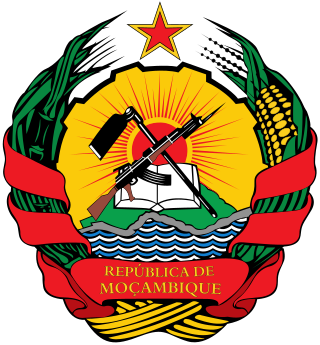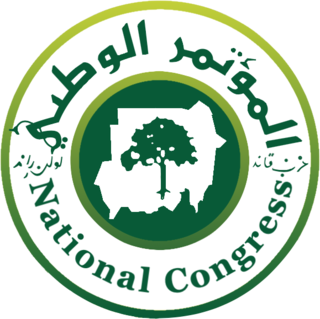
Politics in Mozambique takes place in a framework of a semi-presidential representative democratic republic, whereby the President of Mozambique is head of state and head of government in a multi-party system. Executive power is exercised by the government. Legislative power is vested in both the government and the Assembly of the Republic.
Single non-transferable vote or SNTV is an electoral system used to elect multiple winners. It is a generalization of first-past-the-post, applied to multi-member districts with each voter casting just one vote. Unlike FPTP, which is a single-winner system, in SNTV multiple winners are elected, typically in electoral districts; additionally, unlike FPTP, SNTV produces mixed representation and makes it unlikely for a single party to take all the seats in a city or a set area, which can happen under FPTP.

General elections were held in South Africa on Wednesday, 14 April 2004. The African National Congress (ANC) of President Thabo Mbeki, which came to power after the end of the apartheid system in 1994, was re-elected with an increased majority.
Regular elections in Albania are mandated by the Constitution and legislation enacted by Parliament. The Parliament (Kuvendi) has 140 members elected for four-year terms. The electoral system is open list proportional representation. There are 12 multi-member constituencies corresponding to the country's 12 administrative regions. Within any constituency, parties must meet a threshold of 3 percent of votes, and pre-election coalitions must meet a threshold of 5 percent of votes.

Bangladesh elects on national level a legislature with one house or chamber. The unicameral Jatiyo Sangshad, meaning national parliament, has 350 members of which 300 members are directly elected through a national election for a five-year term in single-seat constituencies while 50 memberships are reserved for the women who are selected by the ruling party or coalition. The Prime Minister is the head of the government. The president who is the head of the state is elected by the National Parliament. The president of Bangladesh is a ceremonial post and does not exercise any control over the running of the state.

Elections in Kenya take place within the framework of a multi-party democracy and a presidential system. The President, Senate and National Assembly are directly elected by voters, with elections organised by the Independent Electoral and Boundaries Commission (IEBC).

Since its establishment in 1947, Pakistan has had a non-symmetric federal government and is a federal parliamentary democratic republic. At the national level, the people of Pakistan elect a bicameral legislature, the Parliament of Pakistan. The parliament consists of a lower house called the National Assembly, which is elected directly, and an upper house called the Senate, whose members are chosen by elected provincial legislators. The head of government, the Prime Minister, is elected by the majority members of the National Assembly and the head of state, the President, is elected by the Electoral College, which consists of both houses of Parliament together with the four provincial assemblies. In addition to the national parliament and the provincial assemblies, Pakistan also has more than five thousand elected local governments.

The National Congress Party was a major political party that dominated domestic politics in Sudan from its foundation until the Sudanese Revolution.
The Government of Sudan is the federal provisional government created by the Constitution of Sudan having executive, parliamentary, and the judicial branches. Previously, a president was head of state, head of government, and commander-in-chief of the Sudanese Armed Forces in a de jure multi-party system. Legislative power was officially vested in both the government and in the two houses – the National Assembly (lower) and the Council of States (upper) – of the bicameral National Legislature. The judiciary is independent and obtained by the Constitutional Court. However, following the Second Sudanese Civil War and the still ongoing genocide in Darfur, Sudan was widely recognized as a totalitarian state where all effective political power was held by President Omar al-Bashir and his National Congress Party (NCP). However, al-Bashir and the NCP were ousted in a military coup on April 11, 2019. The government of Sudan was then led by the Transitional Military Council (TMC). On 20 August 2019, the TMC dissolved giving its authority over to the Transitional Sovereignty Council, who were planned to govern for 39 months until 2022, in the process of transitioning to democracy. However, the Sovereignty Council and the Sudanese government were dissolved in October 2021.

California's 37th congressional district special election, 2007 was held on August 21, 2007 to replace the seat of Congresswoman Juanita Millender-McDonald, who died of cancer on April 22, 2007. California State Assemblymember Laura Richardson received the plurality of votes in an open primary election on June 26. Since no candidate won a majority of votes in that contest, the special election was held on August 21, in which Richardson was the winner.

General elections were held in Sudan between 11 and 15 April 2010, extended from the original end date of 13 April. The elections were held to elect the President and National Assembly of Sudan, as well as the President and Legislative Assembly of Southern Sudan. The election brought to the end the transitional period which began when the decades-long Second Sudanese Civil War ended in 2005.

A referendum took place in Southern Sudan from 9 to 15 January 2011, on whether the region should remain a part of Sudan or become independent. The referendum was one of the consequences of the 2005 Naivasha Agreement between the Khartoum central government and the Sudan People's Liberation Army/Movement (SPLA/M).
Fatima Abdel Mahmoud was a Sudanese politician, leader of the Sudanese Socialist Democratic Union. In 1973 she was one of the first women to hold political office in Sudan, and she took part in the April 2010 Sudanese general election as the country's first female presidential candidate.

General elections were held in Sudan to elect a President and National Assembly between 2 and 17 March 1996. They were the first elections since 1986 due to a military coup in 1989, and the first simultaneous elections for the presidency and National Assembly. 125 members of the 400-seat National Assembly had been nominated before the election, leaving 275 seats to be elected. 900 candidates ran for the 275 seats. There were no political parties at the time, and all candidates ran as independents.

The temporary de factoConstitution of Sudan is the Draft Constitutional Declaration, which was signed by representatives of the Transitional Military Council and the Forces of Freedom and Change alliance on 4 August 2019. This replaced the Interim National Constitution of the Republic of Sudan, 2005 (INC) adopted on 6 July 2005, which had been suspended on 11 April 2019 by Lt. Gen Ahmed Awad Ibn Auf in the 2019 Sudanese coup d'état.

Elections for a General National Congress (GNC) were held in Libya on 7 July 2012, having been postponed from 19 June. They were the first elections since the overthrow and death of longtime ruler Muammar Gaddafi a year earlier, the first free national elections since 1952, and only the second free national elections since Libya gained independence in 1951.
The Popular Congress Party is a Islamist political party in Sudan. The party was founded by Hassan al-Turabi.

Early general elections were held in Kuwait on 27 July 2013. The elections were required after the Constitutional Court dissolved Parliament and annulled the results of the December 2012 elections. Voter turnout was an estimated 52.5%, which was higher than expected despite an opposition boycott, and only 7% lower than the non-boycotted February 2012 elections.

General elections were held in Sudan on 13–16 April 2015 to elect the President and the National Assembly. They were originally scheduled for 2 April, but were delayed by eleven days. These were the first elections to be held following the secession of South Sudan.

Elections were held in Jonglei State on 10–15 April 2010 as part of the 2010 Sudanese general election, with voting for President of Sudan, National Assembly of Sudan, President of Southern Sudan, Southern Sudan Legislative Assembly, Governor of Jonglei State and the Jonglei State Legislative Assembly. The elections were the first in Sudan for over two decades, held in the aftermath of the 2005 Comprehensive Peace Agreement between the Sudan People's Liberation Movement (SPLM) and the Government of Sudan of Omar al-Bashir. The election was carried out in precarious security conditions, with ethnic conflicts prevalent in the state. The elections were won by the SPLM, with the exception of a handful of seats. Disputes over the election results led to the outbreak of two armed insurgencies.














